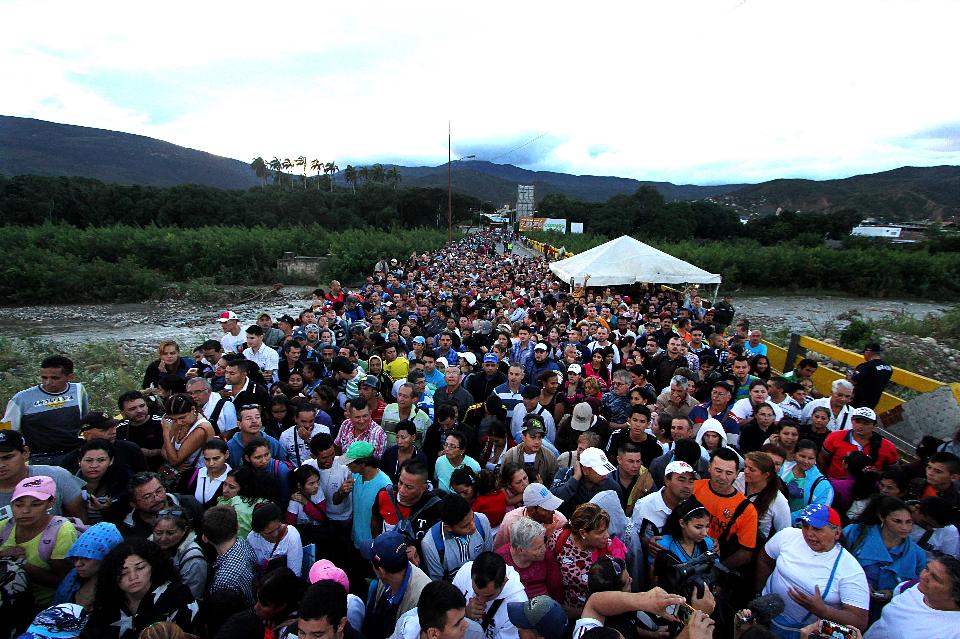
Hundreds of Venezuelans flood a border crossing with Colombia on July 17, 2016, looking for reasonably priced basic necessities. Borders had been closed by the government for nearly a year. (George Castellano/AFP/Getty Images)
A few weeks ago I wrote about shortages in food, electricity, and other basic necessities in Venezuela. The causes are many, but chief among them are declining oil prices and economic overreliance on oil, combined with significant corruption and gross mismanagement of the economy by the government. The following is an update on the situation in Venezuela based on new information and events.
On July 26, Reuters released a special report highlighting corruption and highly questionable business practices of Venezuela’s state firm, Petroleos de Venezuela. It’s a perfect example of how the country with the world’s largest oil reserves in the world can be in economic crisis.
In August 2015 Petroleos sought bids for a multi-billion dollar project to extract oil from the country’s Orinoco Belt crude oil reserve. Despite strong interest from well-established oil industry developers such as Halliburton and Weatherford, Petroleos awarded the $4.5 billion contract to Trenaco, a tiny trucking and trading firm based in Colombia with no oil project experience whatsoever. Yet, Trenaco was somehow so sure it would emerge with the winning bid that it started hiring workers and buying equipment months before the announcement that it had landed the deal.
When word of the unexpected contract recipient got out, foreign oil firms—who, based on other contracts in Venezuela, would have to work with Trenaco in a joint venture—rebuked the deal. The Reuters report termed this an “unprecedented rebellion.” One multinational oil company wrote to Petroleos that Trenaco was completely unqualified technically and financially to take on such a huge project, which would involve drilling around 600 wells. Another said “there were red flags everywhere” concerning the contract. The plans for Orinoco fell apart this past winter, and Trenaco has since been liquidated.
The report goes on to describe how the Trenaco fiasco is just one of many examples of corruption in Venezuela’s oil industry. In fact sources from inside Petroleos, its partners, lawyers, union organizers and politicians all paint a picture of “a culture of corruption that ranges from the trivial—giving a gift to a secretary to land a meeting with a top [Petroleos] executive—to the systemic, such as funneling kickbacks in return for large contracts.” Even the U.S. Justice Department is targeting Petroleos in a bribery investigation.
In my earlier article I mentioned how a petition calling for a recall referendum is gaining support. If moved forward (which, given that it could remove the ruling regime from power, is unlikely), the referendum would call for a presidential election before current leader Nicolas Maduro’s term ends in 2019.
On July 23, Washington Post‘s Mariana Zuñiga wrote about a disturbing development: a significant number of government employees who signed the petition have recently been laid off. And apparently this has happened before: in 2003-04 when then President Hugo Chavez was subject to a recall referendum, a similar wave of layoffs and workplace discrimination fell upon government civil service workers who signed the petition.
Some relief may be on the horizon. On July 25 the AP reported that state banks from a number of neighboring countries, through the Latin American Reserve Fund, agreed to loan Venezuela $482 million over 3 years.
But it remains to be seen how much of that money will reach the people who need it. The economic situation for much of Venezuela’s population remains dire. On July 17, border crossings to Colombia were opened for the first time in nearly a year and Venezuelans deluged nearby Colombian towns, seeking supplies of basic goods not available in their country.
There is a lot that needs to be fixed in Venezuela. Unfortunately it remains to be seen whether the current government is capable of doing so, or whether they will allow a different leadership to try. In the meantime the Venezuelan people continue to struggle.